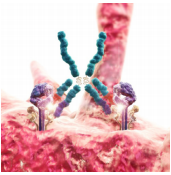Immunotherapy for New-Onset Type 1 Diabetes Falters in Clinical Trials

Artist’s illustration of an anti-CD3 antibody binding to a T-cell. The antibody is x-shaped and shown in green; the CD3- receptor is in purple and green.
In a major disappointment, two treatments for new-onset type 1 diabetes that were previously hailed as breakthroughs have floundered in clinical trials. The two treatments, teplizumab and otelixizumab, are known as anti-CD3 antibodies. These antibodies are designed to block immune cells from destroying insulin-producing beta cells, thereby slowing the progression of type 1 diabetes (see our Learning Curve in diaTribe #15). The Juvenile Diabetes Research Foundation (JDRF) and the National Institutes of Health (NIH) contributed significantly to the early development of these anti-CD3 antibodies. Subsequently, the JDRF partnered with two biotech companies, MacroGenics and Tolerx, which began commercial development of teplizumab and otelixizumab, respectively.
The initial results for both of these anti-CD3 therapies were very promising. In phase 2 trials, individuals treated with either therapy had significantly less destruction of beta cells and more insulin secretion many months after type 1 diabetes was diagnosed. However, larger subsequent clinical trials have failed to replicate these early results. The first piece of disappointing news came last October, when MacroGenics and its partner, Eli Lilly, announced that they had suspended developing teplizumab after it failed to show efficacy in a year-long phase 3 trial. Earlier this month, Tolerx and its partner, GlaxoSmithKline (GSK), reported similarly disappointing results from a large trial of otelixizumab called DEFEND-1. In light of these results, the companies halted DEFEND-2, their second large trial of otelixizumab. However, Tolerx and GSK have indicated that they will continue to study otelixizumab to see if other doses can be more effective. Although anti-CD3 therapy has suffered an enormous setback, the road ahead for this and other immune-modulating therapies in new-onset type 1 diabetes has not been closed off. –MY







